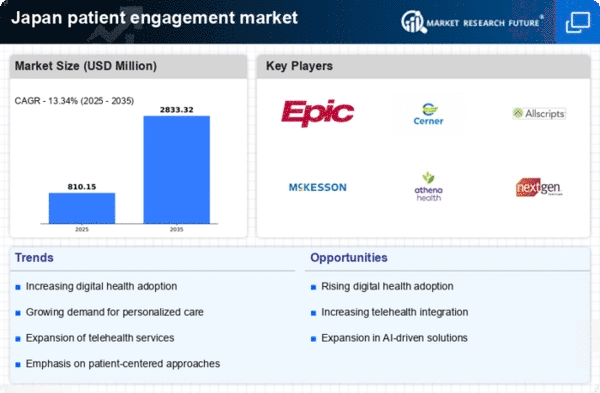Growing Emphasis on Health Literacy
Health literacy is becoming increasingly important in the patient engagement-solutions market in Japan. As patients become more informed about their health conditions and treatment options, they are more likely to engage actively in their healthcare journey. This shift is prompting healthcare providers to develop educational resources and tools that enhance patient understanding and involvement. Recent studies indicate that patients with higher health literacy levels are 40% more likely to adhere to treatment plans. Consequently, healthcare organizations are focusing on creating user-friendly engagement solutions that promote health literacy, ultimately leading to better health outcomes and patient satisfaction.
Increasing Demand for Personalized Care
The patient engagement-solutions market in Japan is experiencing a notable shift towards personalized care. Patients are increasingly seeking tailored healthcare experiences that cater to their individual needs and preferences. This demand is driven by a growing awareness of health issues and the desire for more control over personal health management. As a result, healthcare providers are adopting patient engagement solutions that facilitate personalized communication and care plans. According to recent data, approximately 70% of patients in Japan express a preference for personalized healthcare services. This trend is likely to propel the development of innovative engagement tools that enhance patient-provider interactions, thereby fostering a more patient-centric approach in the healthcare system.
Technological Advancements in Healthcare
Technological advancements are significantly influencing the patient engagement-solutions market in Japan. The integration of mobile health applications, telemedicine, and wearable devices is transforming how patients interact with healthcare providers. These technologies enable real-time monitoring and communication, which enhances patient engagement and adherence to treatment plans. For instance, the use of mobile health applications has increased by over 50% in recent years, indicating a strong shift towards digital solutions. This trend suggests that healthcare organizations in Japan are likely to invest more in advanced patient engagement technologies, aiming to improve health outcomes and streamline care delivery.
Rising Focus on Chronic Disease Management
The increasing prevalence of chronic diseases in Japan is significantly impacting the patient engagement-solutions market. With conditions such as diabetes and hypertension on the rise, there is a growing need for effective management solutions that engage patients in their care. Healthcare providers are recognizing the importance of patient engagement in managing chronic diseases, as engaged patients are more likely to adhere to treatment regimens and make healthier lifestyle choices. Data suggests that approximately 30% of the Japanese population is living with a chronic condition, highlighting the urgent need for innovative engagement solutions that support chronic disease management and improve patient outcomes.
Regulatory Initiatives Supporting Patient Engagement
Regulatory initiatives in Japan are playing a crucial role in shaping the patient engagement-solutions market. The government is actively promoting policies that encourage the adoption of patient-centered care practices. These initiatives aim to enhance patient participation in healthcare decision-making and improve overall health outcomes. For example, recent regulations have mandated that healthcare providers implement patient engagement strategies as part of their service offerings. This regulatory support is likely to drive the growth of the patient engagement-solutions market, as organizations seek to comply with these requirements while enhancing their service delivery.






















Leave a Comment